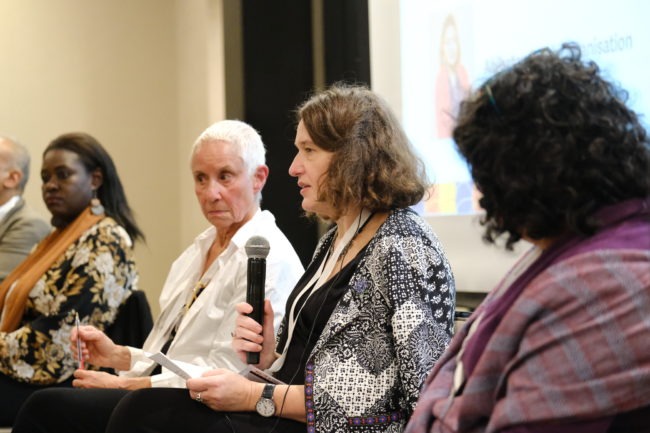From October 27 to 31, 2025, in Bogotá, Colombia, the International Federation for Human Rights (FIDH) held its 42nd International Congress. Human rights defenders from more than 150 member organizations from Africa, Asia, Europe, the Middle East, and the Americas gathered to reflect on contemporary anti-democratic and authoritarian trends, the state of human rights worldwide, and to shared experiences, debated strategies, and renewed collective commitment to justice, equality, and human dignity.

Stefania Kulaeva, director of the ADC Memorial, spoke at the plenary session “In the face of neo-fascism, populism and conservatism: feminist resistance and alternatives”:
In the last decade the situation with women rights, minorities and indigenous peoples rights, LGBT+ rights changed in Eastern Europe and Central Asia dramatically. The lead role in discrimination and oppression plays the government of Russia – repressing all the human rights activists, but also criminalizing the whole groups – such as LGBT+, declared “extremist movement” and minorities and indigenous peoples rights organisations that were listed as terrorists.
The newly adopted migration concept of Russia states that the population of the country is supposed to grow “naturally”, while the migrates are put under the impossible control that will force most of them to leave Russia. The idea of natural growth of population is clearly connected to limiting the reproductive rights of women, the chances to avoid or to end unwanted pregnancy. On regional level there are already restrictions to medical abortions and other measures (sterilization, pills) and at the same time authorities try to stimulate early motherhood by paying to the school girls and students who give birth while being very young or even children. Unfortunately the bad example of Russia is followed by some of the neighboring countries that adopt similar laws targeting LGBT+ and women rights (e.g. Georgia and Kyrgyzstan). Meanwhile harsh migration policy of Russia – based on racism and chauvinism – painfully affects the country donors of migrants (Central Asia and Southern Caucasus). While Ukraine is fighting Russian imperial aggression on the battle-fields other oppressed peoples who live within the borders of Russian Federation face discrimination, exclusion and oppression, when they try to stand for their rights they get criminalized and repressed.
Talking about resistance we should first of all think of the high price for it – thousands or political prisoners in Russia and Belarus, growing number in Azerbaijan, Georgia, Tajikistan and other countries of Central Asia.
Most of these prisoners are men, but women do play important role too – some also get many years of prison for their brave actions. These are human rights defenders (Nasta Loyko and Marfa Rabkova in Belarus), artists (Zhenya Berkovitch and Svetlana Petrychuk from Moscow), feminists, minorities rights activists (Crimean Tatars women, indigenous of Siberia). Some are just school girls accused in terrorism for writing a slogan or a poem (like Dasha Kozyreva in St.Petersburg), some are mothers of many children (many are on the occupied territories of Ukraine – accused in treason for cooperation with Ukrainian side). Many women are caring out less demonstrative and more practical tasks – helping refugees (Nadin Geisler in Belgorod got 20 years of prison for this work on the border with Ukraine), saving victims of domestic violence, supporting political prisoners.
Solidarity plays the key role in their lives as it should be for us too.









 Feedback
Feedback